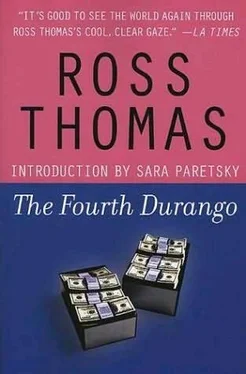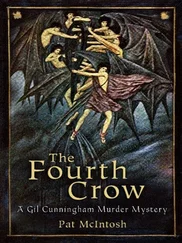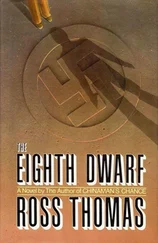“Something like that,” the mayor said.
“Wonder what ever happened to him?”
“No idea.”
“After the rest of your bunch left for Colorado, the four of you all moved into that old shack out on Boatright, didn’t you? Then Teddy just sort of disappeared-like he’d jumped into the ocean and drowned or something.”
“He jumped on a bus,” Fork said.
“Wonder where he went?”
“No telling.”
Coates shook his head sadly, as if at some old friend’s mysterious disappearance, and turned to the mayor. “B. D., if I thought bringing a task force in to find a crazy killer’d hurt you politically, I’d’ve never even suggested it. I didn’t think it would then and I still don’t. But I’ll accept your judgment.”
“Good.”
“Thing is, what if something happens and our killer’s not behind bars after all come July fourth?”
“There’s another possibility, Charlie,” Fork said.
“Possibility of what?”
“Of his being dead by the fourth.”
“Shot while resisting maybe?”
Fork shrugged.
“Not as much ink and airtime in that, Sid. Thing to do is bring him to trial and let it run forever.”
The sheriff rose, placing his empty beer bottle on the coffee table that had been fashioned from the old steamer trunk. Huckins leaned forward and slipped a coaster beneath it. Staring down, watching her, Coates said, “I’d still like an answer, B. D.”
“To what?”
“To my ‘what if’ question. What if, despite all Sid’s efforts, the killer’s neither behind bars nor dead by the fourth of July? What if he’s still loose out there?”
“Then I’d reconsider inviting your task force in.”
“And if we collared him?”
“I’d have to rethink my endorsement policy.”
The sheriff beamed, crinkled his eyes and suddenly snapped his fingers as if he had just remembered something. He even said, “Damn,” causing Sid Fork to wonder whether the sheriff really had any future in politics where a modicum of acting ability is as necessary as money.
“Almost forgot, Sid, but we found that pink Ford van up on One-Oh-One at a rest stop. Wiped clean as a whistle except for what ninety-nine percent of ’em always forget-the little lever that moves the driver’s seat up and back. Got three good ones off the left hand plus a partial thumb. The state and the Feds are both checking ’em out and if we get a make back, I’ll let you know.”
The deputy, Henry Quirt, was now up and looming over Coates’s right shoulder. “You told me to remind you of that telex we got from Lompoc, Sheriff.”
Coates snapped his fingers again, causing the chief of police to decide that the sheriff’s performance really needed a lot of work. “Shit-oh-dear,” Coates said. “Forgot that, too. Seems the FBI’d like to talk to a couple of guys about something or other that happened at the Lompoc Federal pen yesterday or the day before-I forget which. But the guys’ names are Kelly Adair and Jack Vines.”
“The other way around,” Quirt said.
Coates thought, nodded and said, “Yeah. Jack Adair and Kelly Vines. Anyway, Quirt and I, just on the off chance, stopped by the Holiday Inn on our way up to your place, B. D., but it seems Adair and Vines checked out around four this afternoon right after that old guy Sloan got it-can’t say I blame ’em-but didn’t leave any forwarding. So if you bump into ’em, Sid, ask ’em to give the Federales in Santa Barbara a shout.”
“There a warrant out for them?” Fork said.
“No, the Feds just want to dialogue a little.” He turned to Huckins. “Of course, I can’t say if anybody else is after ’em or not. But on the other hand, everybody’s got enemies, right, B. D.?”
“So they say.”
Coates thanked her for the beer, said good night and left, trailed by his six-foot-three deputy. After the sheriff’s black Lincoln Town Car with the twin whip antennae pulled away, B. D. Huckins turned from the window to Sid Fork.
“He knows it’s Teddy,” she said.
Fork nodded.
“But that’s not why he wants to bring his task force in.”
“No.”
“What he really wants is to prove we’ve somehow been fiddling the books, send us to jail and ride that right into the county supervisor’s office.”
Fork thought about it, nodded and said, “It might work. But not if I find Teddy.”
“Well. Can you?”
Fork moved over to Huckins, tilted her chin up and kissed her. “I don’t have to find Teddy,” he said. “All I have to do is make him want to find me.”
The thirty-nine-year-old frame and stucco house was on the southeast edge ofDurango in the Explorer subdivision that consisted of three short streets named Lewis, Clark and Fremont. There would have been more houses on streets named after other explorers if the novice developer, a former high school history teacher with a modest inheritance, hadn’t run out of both money and buyers during the recession of 1949.
At 12:20 A.M. Sid Fork was parked on Fremont under a fragrant thirty-nine-year-old magnolia, waiting for the light to go off in the third house from the corner. It was a TV set’s bluish light and, since the house boasted no dish antenna, Fork was almost certain that those inside were watching a rented videocassette on their VCR. With luck, he thought, it might even be a short one-maybe a forty-five-minute X-rated feature.
After the bluish light went off at 12:32 A.M., Fork gave the occupants another twenty-nine minutes to go to bed and perhaps even to sleep. By 1:01 A.M. he was pounding on the front door. It was opened less than a minute later by a sleepy-looking Henry Quirt, the deputy sheriff, who wore a white T-shirt, pale blue boxer shorts and aimed a short-barreled.38-caliber Smith & Wesson revolver at the chief of police.
“Christ, Sid, it’s one in the fucking morning.”
“Mind pointing the piece someplace else?”
After Quirt lowered the pistol to his side, Fork said, “I was already in bed myself, Henry, when it just hit me all of a sudden.”
“What?”
“Be better if I told you about it inside.”
Before Quirt could respond, a woman’s voice called from the rear of the house. “Who is it, honey?”
Quirt turned his head to call his answer. “Sid Fork.”
“What’s he want?”
Quirt hesitated before calling his second answer, “Business.” He looked back at Fork, all sleepiness gone, and said in a voice that only the chief of police could hear, “It is business, isn’t it, Sid?”
Fork waited in the living room for the deputy sheriff, who had said he wanted to put some clothes on. Out of habit, Fork inventoried the room, pricing its contents that included a matching couch and easy chair that were protected by clear-plastic slipcovers. Of more interest was the triangular maple whatnot stand in one corner whose five shelves held nine chrome-framed photographs, at least two dozen miniature china cats and kittens and five conch-like seashells that Fork guessed were from Florida.
There were four nicely framed prints on the walls, all of them pastoral scenes, which Fork placed in nineteenth-century Europe, probably France, and decided he didn’t much like. He scuffed the edge of his right shoe along the beige nylon carpet, put its price at $4.95 a square yard wholesale and moved over to the built-in bookcase that contained a Bible, a fairly new set of the Encyclopaedia Britannica and nine paperback novels that turned out to be Harlequin romances.
The room’s focus, however, was on its home entertainment center-a large oak stand with staggered shelves that held a 21-inch Sony TV set with an attached VCR and a complicated-looking audio system that could play LP records, tapes and compact discs. Two La-Z-Boy recliners were aimed at the center. On top of the TV set was a boxed videocassette. Fork went over, read the label, which said it was Debbie Does the Devil, and tried to remember whether he had ever rented it.
Читать дальше












